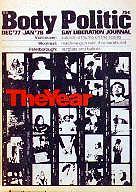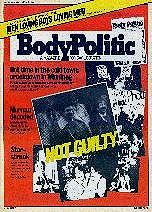
The Body Politic, Issue 39,
December 1977 / January 1978
GOING BACK(WARDS)
Text crimes
The very long & contentious career of
"Men loving boy loving men"
Rick Bébout, June 2003

The Body Politic, Issue 51,
March / April 1979
Words have power.
It can seem a cliché -- "The pen is mightier" and all that. And, as we'll see in this tale, words do not always have power in the moment: whatever thought they urge may not be taken up, or not much; whatever light they might cast can fall into darkness.
But we know, for sure, that words have power when the powers that be fear words; when censorious forces want to make sure no one will ever be free to hear them, see them, read them -- or even know they exist. Or ever did exist. Even words once freely circulated in public discourse risk being pushed back into oblivion.
Like the words here.
"Men loving boys loving men" first saw the light of day on November 21, 1977, release date of the December 1977 / January 1978 issue of a radical little gay mag called The Body Politic. The article, by Gerald Hannon, a longtime member of its governing collective, had in fact been written in the early summer. It got laid out soon after, ready to run.
It would not be the paper's first foray into this minefield. Its September 1976 issue had featured another piece by Gerald: "Seven years to go: The plight of gay youth," its cover draw: "Anthony is 15. So is Gary. For them sex means breaking the law." Two issues later he gave us "Advice on consent: Youth sexuality: the consent hoax and why it persists." (Gerald himself, as you'll see, finds kids more unnerving than hot. Not that many would later believe it.)
But even radical perverts can suffer a case of nerves: that summer got very messy; the collective held off on "Men loving boys" in hope of a safer moment. It never came. But then, looking back on their little mag's then six-year history, they realized they'd not got where they were by running for supposedly safe cover. They gave that risky article just a modest redesign, shots of real boys replaced by anonymous (and in fact adult) silhouettes. The printer didn't balk. So off it went, out into the world.
Issue 39 sat modestly on sale for a month, its cover flagging justice abused in Vancouver; a gay group threatened in Peterborough; a brutal raid on a Montreal gay bar, Truxx, and its ensuing riot. If not "Men loving boys loving men." Unless one was mindful of particular preoccupations "The Year" had offered up.
On December 22, Toronto Sun columnist Claire Hoy (clearly one of TBP's most avid readers) found it. And said so. Repeatedly, his Christmas Day treat: "Kids, not rights is [sic] their craving." His paper backed him two days later with an editorial most imaginatively titled: "Bawdy politic." On the morning of December 30, 1977 they ran a story headlined: "Crown to study sex mag."
That afternoon, at 5 pm on a Friday before a long holiday weekend, five cops arrived at The Body Politic's 5th foor office. They carted down not just copies of that "sex mag" (rivalled in explicitness perhaps only by The New York Review of Books) but 12 boxes of business files, manuscripts, books, correspondence and, most ominously, lists of every subscribers' name and address.
Charges came on January 5, 1978: "Use of the mails for the purpose of transmitting or delivering anything that is obscene, indecent, immoral or scurrilous."
The trials of
The Body Politic
See Promiscuous Affections
from late 1977 to autumn 1983 (with an Apr 1985 postscript: final return of materials seized on Dec 30, 1977). Links there lead to further details.
The rest, as they say, is history. The Body Politic was in court for nearly six years over "Men loving boys loving men." (You can find tales of its trials, among other tales, in my memoir Promiscuous Affections.) Those trials went many rounds: two "Not Guilty" verdicts were appealed; none of that seized material ever showed up in court as evidence -- though the police kept much of it for more than seven years.
Defence counsel Clayton Ruby called our adventures "the most appealed summary case in the history of mankind." The Crown finally pooped out on their final appeal, letting it lapse on October 15, 1985. In short (if after a very long time): We won.
Even before we had for sure, we had re-run "Men loving boys," along with "Another look" at issues of power, consent, and young people's sexuality, in TBP's March / April 1979 "Not Guilty" issue. They and other related pieces, among them Jane Rule's June 1979 essay, "Teaching sexuality," we also put into a book: Flaunting It! A decade of gay journalism from The Body Politic, published in June 1982.
So: It was history, those word wrenched free of their fetters. Or so we thought.

The Toronto Sun,
November 25, 1995
Kid-sex
Hooker Prof Scandal!
More details & a link to those 1995 combat websites (now part of the Canadian
Lesbian & Gay Archives site, literally archived) appear in
Promiscuous Affections
1995: October-December
Nearly 18 years later, "Men loving boys" was suddenly back in the news. Along with its author: Gerald, teaching journalism at Ryerson (then Polytechnic) University, was about to become a victim of what so often passes for "journalism."
If for practising that trade himself. In The Globe and Mail, March 11, 1995, Gerald had a two-page feature on a younger journalist, Joseph Couture, who had exposed a much-touted "kiddie porn ring" in London, Ontario -- as a police-fed media panic over teenage "kids" working as hustlers.
Another journalist, Judy Steed (she of the 1994 exposé Our Little Secret: Confronting Child Sexual Abuse in Canada), attacked Ryerson for tolerating the likes of Hannon in the hallowed halls of scribe academe: he was clearly not "objective." The Toronto Sun picked up the story. And did some homework: on November 14 Gerald became "the professor of desire," accused of using the classroom to proselytize: "Prof pushes a perverse idea." "Prof backs adult-kid sex." "Kid-sex prof stands ground."
Ryerson launched a probe. So did the cops: "Police sex squad probes professor," the November 21 Sun said, looking into allegations that Gerald had "watched a man having sex with a 12-year-old boy." Eighteen years before, in 1977. In "Men loving boys loving men."
But it was Gerald's other trade -- no secret, if news to the Sun -- that led to a truly wild media-whore feeding frenzy: "Ryerson Prof: I'm a Hooker." He was (and still is, if as a mere instructor never any more a "prof" than a "pedophile"). That did lead to one telling cartoon, by Montreal's much-famed Aislin, captioned: "Oxymoron of the year: Journalism professor continues to work as prostitute."
This tale, too, dragged on for ages. But it also gave fresh life to some thought from the '70s. The crew coming to Gerald's defence, mostly old TBP hands and artist allies, had computer skills: "Men loving boys," "Another look," and Jane Rule's "Teaching sexuality" all ended up online, websites added to the arsenal of political action. Jane wrote me on December 10:
- "I'm very glad I wrote 'Teaching sexuality' when I did and that it can be recycled on the internet now. Though I don't always agree with Gerald, I think of him as one of the few who can keep us honest, insisting that we look at what really is, to avoid nothing, to think through to some sort of sense. The dishonesty, hypocrisy, and vindictiveness aimed at him now simply enrages me."
You can find more on that flap in my memoir too, with links to much more. Gerald did survive, if unnerved this time not just by kids but a bizarre and truly frightening phone stalker. "Men loving boys" survived too -- rescued in the '70s under a banner emblazoned "Freedom of the Press," this time "Academic Freedom."
If not quite. Gerald, cleared by student testimony of that "proselytizing" charge, did go on teaching. For a while: in June 1996 Ryerson refused to renew his contract. He and his union launched a challenge; Ryerson relieved itself of its embarrassing "prof" with a kiss-off cash settlement. He used it to fund "The Gerald Hannon Prize for Dissenting Journalism." Rye's rulers said no to that honour. The student council, RyeSAC, endorsed it -- but later had second thoughts.
On November 26, 1999 the Sun -- rehashing the story four years almost to the day after their huge "Hooker Prof" headline, the same line again atop page 1 -- reported Gerald back at Ryerson. As a guest lecturer: "Prof-titute back on campus." If without what the Sun had called his "'shit-disturber' prize."

The Globe and Mail,
May 13, 2003
Media madness did die down over the "Kid-sex Prof," if not over kids and sex. The next bit on "Men loving boys" itself would be a mere blip. In the moment. If, in time, maybe the most disturbing madness of all.
On May 13, 2003, the once-grey Globe and Mail ran a bright colour photo of The Body Politic's March / April 1979 issue: the one in which we'd run "Men loving boys loving men" again, along with "Another look." The headline: "1977 sex article back in court." In fact it had been since 1997, when a Northern Ontario judge found a teacher guilty "of possessing child pornography in connection with a copy of the article and several critiques of it."
That teacher is in jail, his conviction under appeal. But I'll let Gerald fill you in on the details -- and his sudden discovery that he's become a "child pornographer" for words he wrote 26 years ago -- in his own piece here: "Courts just love Men Loving Boys."
That May 13 Globe report quoted Brenda Cossman (University of Toronto Law professor and member of the board of Pink Triangle Press, in court all those years as publisher of The Body Politic, also co-publisher of Flaunting It!):
- "For those who have been warning that the new kiddie porn law is horrifyingly broad, this may be proof that the sky is falling. ... Everybody has taught that article. Everybody has read it. Everybody has debated it. It takes my breath away that after all this, they are going to try to suggest it's kiddie porn. If I were an archivist or a librarian, I'd be terrified."
Some no doubt have been. That "new kiddie porn law" (rushed through Parliament by the Tories in June 1993, just in time for an election) deemed any portrayal of sexual acts, in images or words, with or among people who are or even appear to be under the age of 18, a criminal act. And, for the first time, it made simple possession of "kiddie porn," so defined -- if not possession of more "adult" brands -- a crime as well, punishable by up to five years in prison.
Thus did John Robin Sharpe, a retired Vancouver city planner, find himself charged for possession of words he had written, for himself. In fact for having written those words at all. He was acquitted. The government of British Columbia appealed, but BC's Court of Appeal upheld the acquittal, saying that the Criminal Code section on possession of child pornography "is truly one step removed from criminalizing simply having objectionable thoughts." BC appealed again.
In January 2001 the Supreme Court of Canada upheld most of that hasty 1993 law, if ruling that it cannot criminalize "works of their own imagination" produced by people "for their own use."
Which may still leave up in the air such scandalous works as Lolita. Or Romeo and Juliet. Or "Men loving boys loving men." But is it art? Frank Addario, in whose lawyerly lap this question has landed, says that in all its years of trial "the Crown did not disprove artistic merit beyond a reasonable doubt."
So dears: Keep your thoughts artistic. And your possessions too. The police want to keep that kiddie porn possession proviso, claiming they'd be "handcuffed" without it. As the head of Ontario's child porn unit has said: "It's the tool we use to enter into a house to gather evidence of the making, the distribution and the importation of child pornography and also to uncover evidence of sexual abuse of children."
Canada's Chief Justice Beverley McLachlin has asked: "Assuming the legislation is overly broad, can it really be saved [from attack via the Charter of Rights] by saying, 'Trust us to use it wisely'?" A federal lawyer had opined before that highest court: "If pedophiles have a constitutional right to free expression, it is dwarfed by the interests of children in our society. We ought not sacrifice children on the altar of the Charter."
But -- in a society hooked on kid-sex panic, flashing massive "Amber Alerts" for every rare missing child (named for an American one, not a colour on the National Security State's Terror Scale of yellow, orange or red, though it may as well be); a society where Child Find covers milk cartons with missing "children" now in their late teens or early 20s, even as they admit that most of the lost kids they tout, striking fear in the hearts of every anxious Mum and Dad, are in fact victims of the Noble Nuclear Family: tots abducted in cruel contests for custody; teen run-aways fleeing domestic abuse -- it may be just fine to burn books on the Altar of Sacred Children.
"Children" as victims. Even as parental property. Not young people as citizens of the world -- worthy not just of "protection," but of true care and respect.
Courtroom drama will, as ever, drag on. In the meantime we risk, in our everyday lives, giving in to melodrama. Will we see Flaunting It! join Mein Kampf on Indigo / Chapters / Coles head honcho Heather Riesman's personal papal Index of books that mere mortals, or pliant "consumers," can't be trusted to read and judge for themselves?
Maybe we'll see more minor cases of nerves: If I read what's been called "kiddie porn" -- if I keep it on my bookshelf, in my library, archive, or home; if I put it up on the Internet -- will I be charged with text crime? Sex crime? Thought crime?
That "chilling effect," as Brenda Cossman among others has put it, can easily induce the most insidious form of censorship: self-censorship. Personal paranoia. Or "best play it safe" bureaucratic runs for cover.
But there is no cover: cowering can positively invite a kick in the ass. The forces of repression will have won the day without having to lift a finger. Or a foot. We'll have done their work for them: kicking ourselves in the head.
On December 30, 1977 the police -- leaving the office of The Body Politic with nearly everything we needed to stay alive -- likely imagined we'd quietly fold what was left of our tent and skulk off into oblivion. They were utterly confounded when we did not.
We can confound still. As Gerald Hannon has said: "If a law this ridiculous is going to remain on the books, I want to be in violation of it." So do I.
As for you: Well, as TBP's collective said in 1977 and again in 1979, both Gerald and I then part of it: "We leave it to you." You're still free to read that "sex article" from that since deceased "sex mag." The media and the police can count on the power of such terms (not to mention "kiddie porn" and "pedophile") to shock, scandalize -- and titillate -- precisely because so few of us know exactly what it is they're talking about.
In 1985 The Body Politic ran a shot of a genial tea-sipping gent, quoted in opposition to New Zealand's then pending Homosexual Law Reform bill: "I don't really know anything about it. But I shudder to think of the subject."
That uninformed shudder is every censor's delight. They count on ignorance. And innuendo. During that 1994 "sex ring" panic, London's (now Toronto's) police chief Julian Fantino loved sitting for media crews before a backdrop of seized "kiddie porn" cassettes piled high. On closer examination they turned out to be everything from Abbott and Costello Go to Mars to Zorro the Gay Blade.
Brenda Cossman, saying of this "sex article" that everybody has read it, taught it, debated it, is maybe talking about everybody in law school. More of us need to see for ourselves the sort of words now risking oblivion as "kiddie porn."
The Body Politic collective did not intend any of those words to be the last one. But reading them again I had a sad revelation: On this front, they may well have been among the last words truly thoughful. More than two decades old, they seem to me ages ahead of anything we have heard since. On this issue that will not go away, public thought has gone way beyond backwards.
But words -- if we insist on our freedom to say them and to have them heard -- do, I suspect, still have power.
Go to the Contents page
Go back to My home page
This page: http://www.rbebout.com/mlb/intro.htm
June 2003 / Last revised: June 28, 2003
Rick Bébout © 2003 / rick@rbebout.com